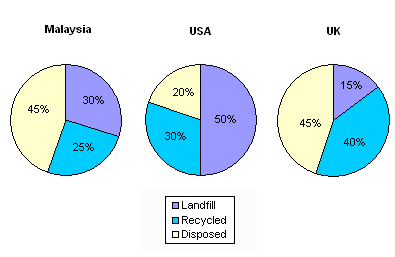IELTS Writing – homework
Knowing that many people have exams this weekend, our teachers at BENCHMARK suggested an exercise.
Academic IELTS candidates
This graph is similar to the recent ones that were given in IELTS exams, which is why it makes a good practice. Here is your homework for the day:
You should spend about 20 minutes on this task.
The following pie charts and the table show how three countries (USA, UK and Malaysia) deal with dangerous waste. Write a report for a university lecturer describing the information below.
You should write at least 150 words.
Amount of waste generated in three countries in year 2000:
mt = million tons
And if you want someone to check your work – use our writing assessment service. Our teachers will be happy to grade your work, give you an approximate Band score and suggest how you could make your report better.
General Training Candidates
Your homework for today is to write a letter as follows, in about 20 minutes:
An Australian company offers money to foreign students to study in Australia. Write a letter to the company.
1. Introduce yourself.
2. Say what do you want to study.
3. How the money will help you.
To get feedback from our teachers, read here how to submit your work for assessment.
Remember – practice is the key!



